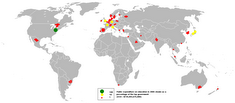 Getty Images
Getty Images
The Eighth U.S. Circuit Court of Appeals on Monday rejected claims by a group of Arkansas parents who sued over their right to transfer their kids out of their home school district in Arkansas to a neighboring one where they thought they could be better educated.
School officials rejected the transfer applications because they said the children’s assigned district, which is predominantly African-American, is still subject to a court desegregation order from more than 40 years ago.
The parents, who are white, sued for violations of due process and equal protection, claiming they had a constitutional right to move their kids.
A lower court last year dismissed their complaint. And on Monday, an Eighth Circuit panel in St. Louis upheld that ruling, saying the Constitution doesn’t guarantee so-called public-school choice.
“We agree with the district court that [no] relevant precedent support[s] the proposition that ‘a parent’s ability to choose where his or her child is educated within the public school system is a fundamental right or liberty, ” stated the opinion, authored by Judge Lavenski R. Smith. “Accordingly, the appellants have failed to prove that they have a protected liberty interest.”
Courts have said parents may not be denied the right to choose private schooling for their children. The Eighth Circuit, though, said the rulings in those cases couldn’t be applied to parents seeking to move their kids within a public education system.
The children of the plaintiffs are enrolled in the Blytheville School District in the delta of northeast Arkansas. They wanted to move their kids to two nearby wealthier districts that they said were “better suited to satisfy [the] children’s educational needs.”
Arkansas allows parents to choose where their kids go to school. A state law giving them that power makes an exception for students enrolled in districts still under federal desegregation orders.
Blytheville officials said it was still subject to a 1971 federal mandate requiring racial balance and said as a policy no transfers are allowed into or out of the district regardless of the applicant’s race. Lawyers for the parents said Blytheville was no longer governed by the order, saying the original judge who approved it declared the matter closed in 1978.
The Eighth Circuit didn’t take a position on who was right in that regard but, in addressing the equal-protection claims, the court said Blytheville had a rational basis for denying the transfer applications.
“This case raises issues of exceptional importance for families and children across the State of Arkansas, ” Jess Askew III, an attorney representing the parents, told Law Blog by email. “Our clients are considering their options, including a request for rehearing by the full court.”










 State school is an expression used in Australia, New Zealand, South Africa, and the United Kingdom to distinguish schools provided by the government from privately run schools.
State school is an expression used in Australia, New Zealand, South Africa, and the United Kingdom to distinguish schools provided by the government from privately run schools.